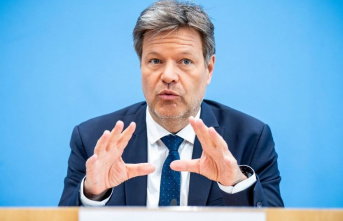The first federal states are abolishing the obligation to wear a respiratory mask in local public transport. The cabinets of Bavaria and Saxony-Anhalt justified their decisions on Tuesday with a stable infection situation. While the CDU and FDP welcomed the decision and called for further steps, Federal Health Minister Karl Lauterbach (SPD) criticized the advance.
After the Conference of Health Ministers (GMK) was unable to agree on a common line on compulsory masks in public transport on Monday, Bavaria and Saxony-Anhalt are now leading the way. In Bavaria, for example, from December 10th instead of a mask requirement, there will only be a recommendation to wear the mask on buses and trains. Bavaria's Health Minister Klaus Holetschek (CSU) said the reason for this was that the corona virus no longer made up the majority of viral diseases - influenza and RS virus had a much higher proportion of those who were ill in hospitals. In this respect, a mask requirement to protect against the corona virus is no longer proportionate. Regarding the corona situation, Prime Minister Markus Söder (CSU) wrote on Twitter: "The infection situation has been stable for a long time."
Masks only voluntarily
Saxony-Anhalt will also be making the wearing of masks in local public transport voluntary in the future. The obligation should already fall here on December 8th. Saxony-Anhalt's Prime Minister Reiner Haseloff (CDU) justified the decision with the vaccination rate and the low burden on the health system from Covid 19 cases. The proportion of people infected with corona in hospitals is less than three percent, said Haseloff. Other diseases and viruses are dominant. Haseloff also referred to the basic immunization rate of 74 percent across all population and age groups. In the over 60-year-olds it is 90 percent.
Schleswig-Holstein wants to decide next week on ending the mask requirement on buses and trains. Prime Minister Daniel Günther (CDU) had already announced three weeks ago that the mask requirement, which was limited until the end of the year, would not be extended. North Rhine-Westphalia, Saxony, Hesse, Baden-Württemberg, Saarland and Mecklenburg-Western Pomerania initially continue to adhere to the mask requirement, as the state governments made clear on Tuesday.
Lauterbach not convinced
Federal Health Minister Lauterbach is critical of the end of the mask requirement in public transport. "I'm just not convinced of that," said the SPD politician on Tuesday in Berlin, referring to the pandemic situation. In the GMK, he and the President of the Robert Koch Institute (RKI), Lothar Wieler, made it clear again on Monday that there were no reasons to say now that masks and the isolation of corona infected people could be dispensed with. Lauterbach referred to a more contagious virus variant to be expected, as well as other RS viruses and a wave of flu.
FDP parliamentary group leader Christian Dürr called on Twitter and in an interview to follow suit in long-distance transport. "We should finally remove the mask requirement in long-distance transport and replace it with a recommendation," he told the editorial network Germany. That should happen before Christmas. After all, it is complicated to explain why a mask has to be worn on some trains and not on others.
FDP boss Lindner positioned himself similarly to Dürr. The Federal Minister of Finance wrote on Twitter that it was a "right decision" that Bavaria was once again relying more on personal responsibility for the corona protection measures. "I hope that this decision will soon be adopted nationwide," added Lindner.
The train is flexible
Deutsche Bahn made it clear that it would follow the legal requirements - even if they differ between the federal states. "For long-distance transport, there are uniform national requirements. These apply to ICE and Intercity trains throughout Germany," said a railway spokeswoman in Leipzig. "In local trains and in train stations, the respective regulations of the countries apply."
The CDU warned of the "next patchwork quilt" in relation to corona rules. Instead of introducing a uniform regulation for local public transport, the traffic light government is causing confusion and frustration among those affected, explained the transport policy spokesman for the CDU/CSU parliamentary group, Thomas Bareiß.
The Association of Transport Companies (VDV) welcomed the end of the mask requirement in public transport. "There is no evidence from abroad, where masks have not been compulsory on buses and trains for months, nor from scientific studies known to us that the number of infections increases exceptionally when masks are no longer worn in public transport," said spokesman Lars Wagner. Martin Burkert, head of the railway and transport union (EVG), made a similar statement. "No one can understand anymore why masks are still compulsory on long-distance trains," he told the German Press Agency.












